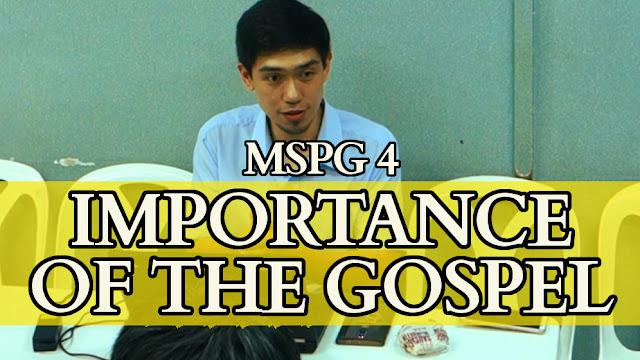Should We Talk About Election and Assurance of Salvation?
There has been a resurgence of Reformed theology among evangelical churches today and a renewed interest in their English-speaking heirs, the Puritans. As a result there is a greater awareness that conversion isn't the result of "praying a prayer" or responding to an altar call (a belief that is popular in Filipino churches). Rather, true conversion is accomplished by the Holy Spirit's work, infusing new life into a spiritually dead soul, producing godward repentance and saving faith. That faith takes hold of the gospel of justification by faith alone in the accomplished work of the incarnate God, by His dying on the cross to pay the penalty for sins (Rom 6:23) and to bring us into His kingdom (1 Pet 2:9). And through a simple faith in that gospel, God accounts Christ's perfect righteousness to us.
In addition to this, there seems to be a greater understanding that true faith leads to a changed life. This has, in turn, led to a reassessment by pastors of the state of many congregations. While a church may affirm the gospel in its formal documents, this does not necessarily translate to the way its ministries are regularly conducted. Awareness of this problem is well expressed in the words of Ray Ortlund, "Let's not assume that our churches are faithful to the gospel. Let's examine whether they are." (emphasis supplied)
This is a very, very good thing.
Too Much Self-Examination?
Having said that, I'm concerned that in certain cases, well-meaning evangelicals may be placing more emphasis on self-examination than is warranted by Scripture. The result, as I've observed in certain cases, is self-focused introspection. When coupled by a wrong understanding of total depravity that underplays the significance of the believer's new nature in Christ, such a bent toward introspection becomes morbid, defeatist, and devoid of the sense of joy and freedom that believers ought to experience in Christ.
The Case of Patrick and Dan
Let me give an example that is fictional but reflects some real-life cases.
A believer, Patrick, is witnessing regularly to a teenager, Dan. Dan is very perceptive, and has exhibited a clear understanding of Christ's person and work. He has even confessed that he is sinful and needs Christ's saving grace. When he expresses this to Patrick, the latter tells Dan that he can do nothing on his own and must rely on God for the grace to repent and believe. He also explains the doctrine of election to Dan, who is amazed to learn that salvation is accomplished by God on the basis of His sovereign election of unworthy sinners. Dan's young head is now swimming with biblical concepts, but he doesn't know how to make sense of it all.
Over time, Patrick explains the tests of genuine saving faith to Dan, such as a deep conviction of sin, an insatiable desire for more of God's word, a sense of gratitude for God's grace, a radical obedience to Christ, an ever-growing conformity to the holiness of Christ, and so forth. Patrick is careful to qualify, however, that none of this is the grounds for justification, but merely the fruit of it.
Dan is absorbing all of this and continues to be receptive to truth. But he is afraid to confess Christ because he just doesn't know if he's elect. In fact, he doubts it because he has the impression that he must find all or at least most evidences of saving faith in himself before he can confidently say he's trusting in Christ (even though Patrick has never quite said it this way). Dan understands the gospel and wants to believe it, but he doesn't because he's afraid his life won't live up to the picture of true conversion that Patrick has painted for him (with accompanying Bible verses).
In the meantime, Patrick has reached his own conclusion about Dan. Having compared his young friend against the long list of evidences of saving faith, he decides that Dan is not yet a believer. He continues to share gospel-related truths with Dan, but he never extends the offer of free grace. And yet Patrick continues to believe that he is doing biblical evangelism.What's the Problem?
What is missing from all this? If one compares it to the Parable of the Lost Sheep in Luke 15, one sees a lack of joy and excitement in the moment a sinner comes to the Savior. Patrick is not trying to lead Dan to a simple faith in the simple gospel. Though well-intentioned, he has put so many obstacles between the sinner and the Savior.
Patrick may understand the doctrine of conversion, but he has applied it wrongly to his evangelism. There is no free offer of grace from God, no clear moment of confession for the sinner, and consequently, no rejoicing by the saints.
The amazing truth that "God so loved the world that He gave His only begotten Son that whosoever believes in Him should not perish but have everlasting life" is the greatest expression of God's love that is available to a yet-unsaved person. And yet it is obscured by an unbiblical compulsion to talk about election and evidences of genuine faith to someone who has not even professed Christ yet!
How Can We Avoid This Mistake?
I hope you see the need to avoid our fictional brother Patrick's mistake. I do, and here are some guidelines I try to follow.
First, I try to communicate the gospel clearly and simply. Paul plainly preached "Christ and Him crucified" (1 Cor 2:2).
Second, I don't burden the non-Christian with a list of evidences of saving faith. I simply call him, as my Lord did, to "repent and believe the gospel" (Mark 1:15).
When Is Self-Examination Appropriate?
I'm not saying that self-examination is wrong. How can I, when it's so clearly taught in Scripture? (Matt 7:15-23; 2 Cor 13:5; 1 John, just to name a few examples.) I think it's great, necessary, helpful when used appropriately. You say, when is that? When you're talking to people who are living in open hypocrisy (Matt 3:8), or those who have been professing faith for a long but have not been bearing spiritual fruit (Luke 13:7), or those who really seem to be believers but are struggling with assurance of salvation (1 John).



